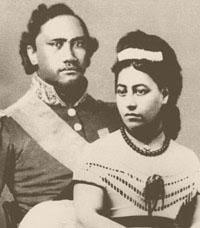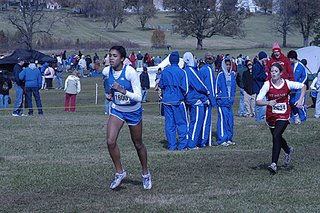 June and I drove from Georgia to Kentucky today; we got in about 6:30 p.m.
June and I drove from Georgia to Kentucky today; we got in about 6:30 p.m.This evening begins the Commemoration of Kamehameha and Emma, King and Queen of Hawaii, 1864, 1865. When in Hawaii earlier this year, I heard a little bit about them, but remembered nothing substantial. Here's what I now know:
Within a year of ascending the throne in 1855, the twenty year old King Kamehameha IV and his bride, Emma Rooke, embarked on the path of altruism and unassuming humility for which they have been revered by their people. The year before, Honolulu, and especially its native Hawaiians, had been horribly afflicted with smallpox. The people, accustomed to a royalty which ruled with pomp and power, were confronted instead by a king and queen who went about, "with notebook in hand," soliciting from the rich and poor funds to build a hospital. Queen's Hospital, named for Emma, is not the largest civilian hospital in Hawaii.
In 1860, the king and queen petitioned the Bishop of Oxford to send missionaries to establish the Anglican Church in Hawaii. The king's interest came through a boyhood tour of England where he had seen, in the stately beauty of Anglican liturgy, a quality that seemed attuned to the gentle beauty of the Hawaiian spirit. England responded by sending the Rt. Rev. Thomas N. Staley and two priests. They arrived on October 11, 1862, and the king and queen were confirmed a month later, on November 28, 1862. They then began preparations for a cathedral and school, and the king set about to translate The Book of Common Prayer and much of the Hymnal .
Kamehameha's life was marred by the tragic death of his four year old son and only child, in 1863. He seemed unable to survive his sadness, although a sermon he preached after his son's death expresses a hope and faith that is eloquent and profound. His own death took place only a year after his son's, in 1864. Emma declined to rule; instead, she committed her life to good works. She was responsible for schools, churches, and efforts on behalf of the poor and sick. She traveled several times to England and the Continent to raise funds, and became a favorite of Queen Victoria's. Archbishop Longley of Canterbury, remarked upon her visit to Lambeth: "I was much struck by the cultivation of her mind...But what excited my interest the most was her almost saintly piety."
The Cathedral was completed after Emma died. It was named St. Andrew's in memory of the king, who died on that Saint's day. Among the Hawaiian people, Emma is still refered to as "our beloved Queen."
Proper:Acts 17:22-31Psalm 33:12-22 or 97:1-2, 7-12Matthew 25:31-40
O Sovereign God, who raised up King Kamehameha IV and Queen Emma to be rulers of Hawaii, and didst inspire and enable them to be diligen in good works for the welfare of their people and the good of thy Church: Receive our thanks for their witness to the Gospel; and grant that we, with them, may attain to the crown of glory that fadeth not away; through Jesus Christ our Lord, who liveth and reigneth with thee and the Holy Spirit ever, one God, world without end.
Amen.
I'm also back in Kentucky from my trip to Haiti for several weeks and have much to write about--later. Ont he way home June bought a French coffee press for Andy and Anna. I need to mail it to them asap.






